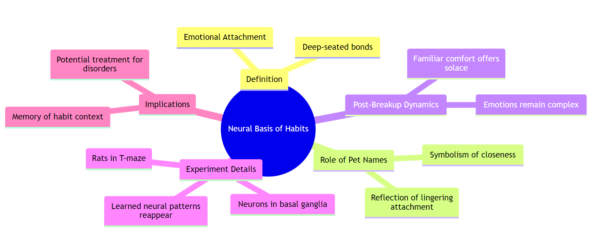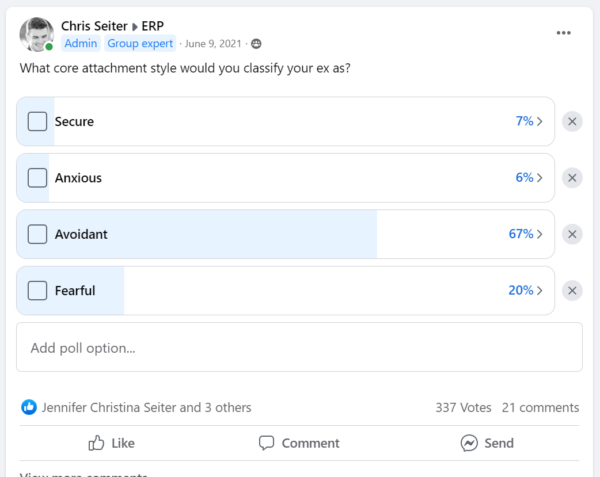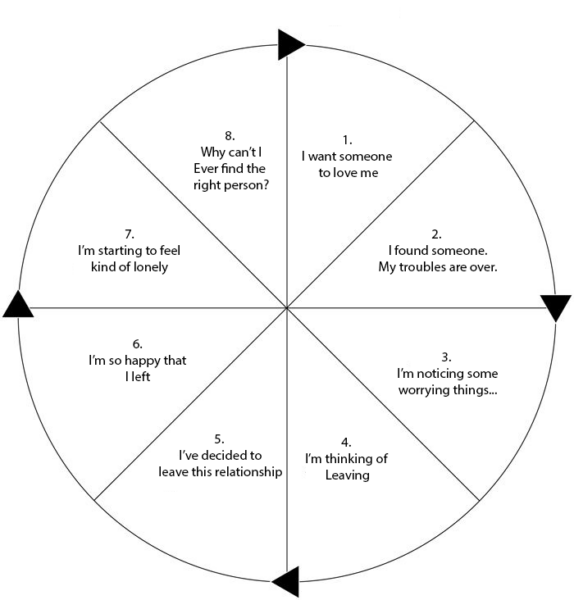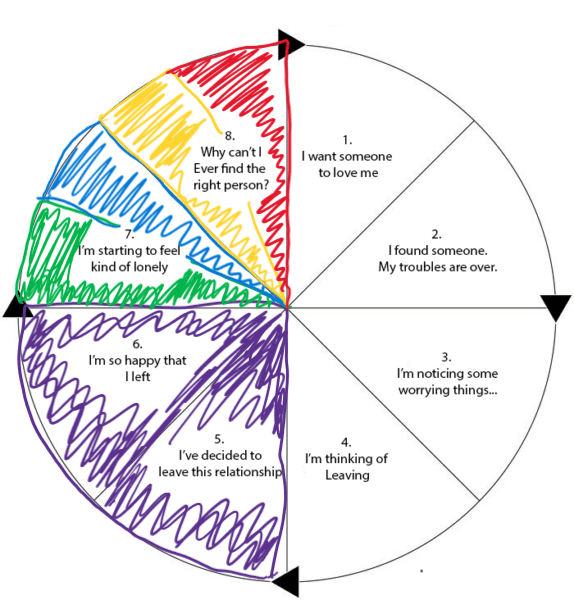Ah the pet name.
Baby…
Honey…
Sweetie…
Babe…
It can be confusing when your ex breaks up with you only to continue calling you by your nickname/pet name. Today though, that’s what we’re here to explore. In my opinion, an ex will continue calling you a pet name for the five following reasons,
- Habitual Behavior: Sometimes, using pet names can become a deeply ingrained habit, especially if the relationship lasted for a long time. In such cases, your ex might use the pet name without even realizing it.
- Emotional Attachment: Continuing to use pet names might indicate that your ex still has lingering feelings or emotional attachments. It could be a subconscious way of holding onto the intimacy that once existed.
- Testing the Waters: If your ex is considering reconciliation or is unsure about the breakup, they might use pet names to gauge your reaction and see if there’s a chance to rekindle the relationship.
- Friendliness: If you’ve maintained a friendly relationship post-breakup, using pet names might just be a sign of camaraderie and affection, without any romantic implications.
- No Hidden Meaning: Not every action has a deeper meaning. Sometimes, an ex might use a pet name simply because it’s what they’re used to, without any ulterior motives.
But personally, I don’t think it’s enough to just plop a bunch of these reasons down, pat you on the back and say, “Ok, good luck.” So, I’ve decided that I’m going to a step further and show you exact situational circumstances in which each of these five pet name instances are likely to occur.
Let’s begin!
1) Habitual Behavior
So, it might simply be the case that your ex is using pet names out of pure habit, and there’s substantial research that supports this.
First off, did you know that approximately 40% of our daily activities can be categorized as habitual behavior?
Over time, your ex might just be using your pet name out of habit. But perhaps the more pertinent evidence supporting the idea that your ex uses pet names out of habit comes from research conducted by Anne Graybiel of MIT’s McGovern Institute. I went through all the trouble to create this graphic for you depicting the findings of that experiment,
Of course, now that I see it, it looks like a gigantic mess. So, hopefully I can give you some clarity.
Graybiel delved into the neural basis of habits and uncovered several intriguing findings.
- They discovered that neural activity patterns in the brain shift when habits are formed
- And these patterns can change again when habits are broken.
- Interestingly, these patterns quickly re-emerge when a previously extinguished habit is reignited.
In Graybiel’s experiment, rats were trained to associate audible cues with a chocolate reward in a T-maze. As the rats recognized the cues, the neurons in the basal ganglia altered their firing patterns. Initially, neurons were active throughout the maze run, but as the rats became accustomed, the neurons fired mainly at the beginning and end of the task.
However, removing the reward caused the neurons to revert to their initial firing patterns, and reintroducing the reward made the learned neural pattern reappear.
The implications are clear: the brain retains a memory of the habit context, and familiar triggers can easily revive habits.
This is the crux of my argument.
Habits aren’t easily forgotten. I’ve emphasized on this website the significance of my 66-day rule and argued that a no-contact rule of 66 days might be excessive.
This is because, technically, after 66 days, one can break a habit. However, the counterargument is Graybiel’s research. Even after 66 days, changing a habit doesn’t mean it’s forgotten.
In fact, Graybiel’s research suggests we never truly forget habits.
While we might manage to sidestep them once they’re ingrained in our brain, the neural pathway remains. Coupled with the fact that post-breakup, reminders of your ex are frequent, and thoughts of them are recurrent, the neural pathway forming the habit of using a pet name gets consistently triggered.
So, when your ex encounters you, they might habitually call you “babe,” “hun,” or “sweetie.”

What Are Your Chances of Getting Your Ex Boyfriend Back?
Take the quizSometimes it might be a more casual pet name, but the underlying point is that habitual behavior could very well explain why your ex continues to use pet names for you.
Circumstances Where This Is Most Likely To Occur
- The two of you are still talking a lot in the post breakup period.
- You are in a friends with benefits situation
- You’ve gone through a breakup but nothing has really changed
2) Emotional Attachment
Pet names, in the tapestry of a relationship, are more than just affectionate monikers.
They become emblematic of the relationship’s unique language, encapsulating shared jokes, memories, and moments of intimacy. These names, borne out of love and shared experiences, become deeply ingrained in the couple’s interactions.
So, when a relationship ends, and one party continues to use these pet names, it’s not always out of habit. Often, it’s a reflection of the lingering emotional attachment, a subconscious yearning for the intimacy and warmth that once was.
Post-breakup, the dynamics change, but emotions remain complex.
The use of pet names can be a manifestation of this complexity, revealing an individual’s struggle between wanting to move forward and being tethered to the past. It’s a delicate dance of emotions, where the familiar comfort of a pet name can offer solace during moments of vulnerability.
However, for the one hearing these names, it can be a whirlwind of emotions, from hope and nostalgia to confusion and pain. It underscores the importance of understanding, communication, and setting boundaries in post-breakup interactions.
Circumstances Where This Is Most Likely To Occur
- Historically they have not used pet names often
- During emotional or vulnerable moments, such as late-night conversations or when they’re feeling down.
- When discussing the relationship or breakup, indicating they haven’t moved on.
- If they initiate contact frequently, especially with emotional or nostalgic content, and use the pet name to emphasize their feelings.
3) Testing The Waters
Most of the clients’ exes that we analyze on this website tend to exhibit an avoidant attachment style.
This means they highly value their independence. Any perceived threat to this independence often prompts them to end the relationship, avoid conflict, and so on.
However, a recurring pattern emerges. Every individual with an avoidant attachment style seems to be trapped in a repetitive cycle, which I term the “avoidant death wheel.”
This cycle comprises eight primary phases:
- They yearn for someone to love them.
- They find someone and believe their problems are resolved.
- They begin to observe concerning behaviors.
- These behaviors, often stemming from anxiety, threaten their sense of independence.
- This prompts thoughts of ending the relationship.
- They decide to leave and initially feel relieved, experiencing “separation elation.”
- Over time, feelings of loneliness creep in.
- They question why they consistently face such relationship challenges, leading them back to the start.
It’s the seventh and eighth stages—feeling lonely and questioning their relationship patterns—that I want to emphasize.
The green, blue, yellow and red stages.
This is when your ex is most likely to “test the waters” and cautiously re-engage. They might subtly gauge your reactions, perhaps by liking, commenting on, or reaching out through a social media post. If you’ve progressed further in rebuilding rapport, they might casually use pet names like “babe” or “hun” to see your response.
Avoidant individuals, much like their anxious or fearful-avoidant counterparts, dread rejection. The fear of being rebuffed makes them anxious. They prefer to reveal their true feelings only when they’re reasonably sure they won’t face rejection. Hence, they might resort to using familiar pet names as a way to gauge your current feelings and reactions.
Circumstances Where This Is Most Likely To Occur
- Some time has gone by where both you and them have had some no contact and then things are starting to ramp up
- When they’re trying to gauge your current feelings or see if you’re seeing someone else.
- If they bring up the possibility of getting back together or ask about your views on relationships.
- During moments of physical closeness, like a hug or touch, accompanied by the use of a pet name to see your reaction.
4) Friendliness
All right, so I’m going to get a little personal here.
In my life, I’ve never been one to use pet names except with those that I’ve dated. Saying I love you, saying I miss you, these are things that I don’t just throw out there.
And it doesn’t just stop there. Any pet name you can think of,

What Are Your Chances of Getting Your Ex Boyfriend Back?
Take the quiz- Hun
- Babe
- Sweetie
- Lovey
Those kind of things are not some things that I do just because I’m being friendly. I’m not like that. Not everyone is like me though. And I remember very distinctly a couple of years ago, I had to go drive to Texas during the COVID pandemic.
When you go on these long road trips by yourself, every once in a while, you stop at a Chick-fil-A or a McDonald’s to kind of get some food. I would sit in the parking lot, eat the food, kind of recharge, I’d have like an audio book I’d be listening to, and then I’d hit the road again.
And I’ll never forget, I was in Alabama and I pulled into this Chick-fil-A. And Chick-fil-A, of course, is always crowded.
So all I’m thinking about is like, I’ve been sitting here for 10, 15 minutes, I’m hungry, it seemed to be sort of the lunch rush, oh, I kind of want a milkshake. All these are the thoughts that are going through my head.
They had like a person with an iPad that would come out, take your order, take the money, and then kind of direct you.
So this person with the iPad comes up to me, knocks on my door, it’s this girl, and she says, how are you doing, hon? And it sort of took me aback. You know, I waited a minute before I responded because I had been so trained in my own life that, hey, you don’t just call people pet names unless you really mean it. So I interacted with her, I gave her my credit card, money, and everything, but then I watched her go to the next car behind me. You want to know what she said? How’s it going, hon?
Some people just are incredibly friendly.
They like to use pet names no matter who they’re with. So essentially, the two circumstances that I want you to keep an eye out for is if your ex was using pet names for everyone before they dated you.
Circumstances Where This Is Likely To Occur
- Before you were dating you noticed they used pet names for everyone
- After you are finished dating they continue to use pet names for everyone
5) No Hidden Meaning
In the aftermath of a breakup, we often find ourselves overanalyzing every little action of our exes.
However, overanalysis can sometimes lead us astray. On occasion, there’s no hidden motive behind an ex using a pet name. As odd as it may sound, they might just use it without any particular reason. Not every gesture carries a profound significance. An ex might simply use a pet name in the same vein as the overly friendly woman I mentioned in my Chick-fil-A story.
They might use it without any ulterior intent. While it might be disheartening to accept such a straightforward explanation, it’s a reflection of reality. I’m uncertain if there’s much more to delve into on this topic, so let’s shift our focus.
I’d like to discuss the scenarios where I believe this is most likely to happen.
Circumstances Where This Is Most Likely To Occur
- In day-to-day interactions, especially if you’re in the same social circle or work environment.
- When discussing practical matters, like shared responsibilities or belongings.
- In group chats or settings where they might use pet names for others as well, indicating it’s just their way of addressing people.



